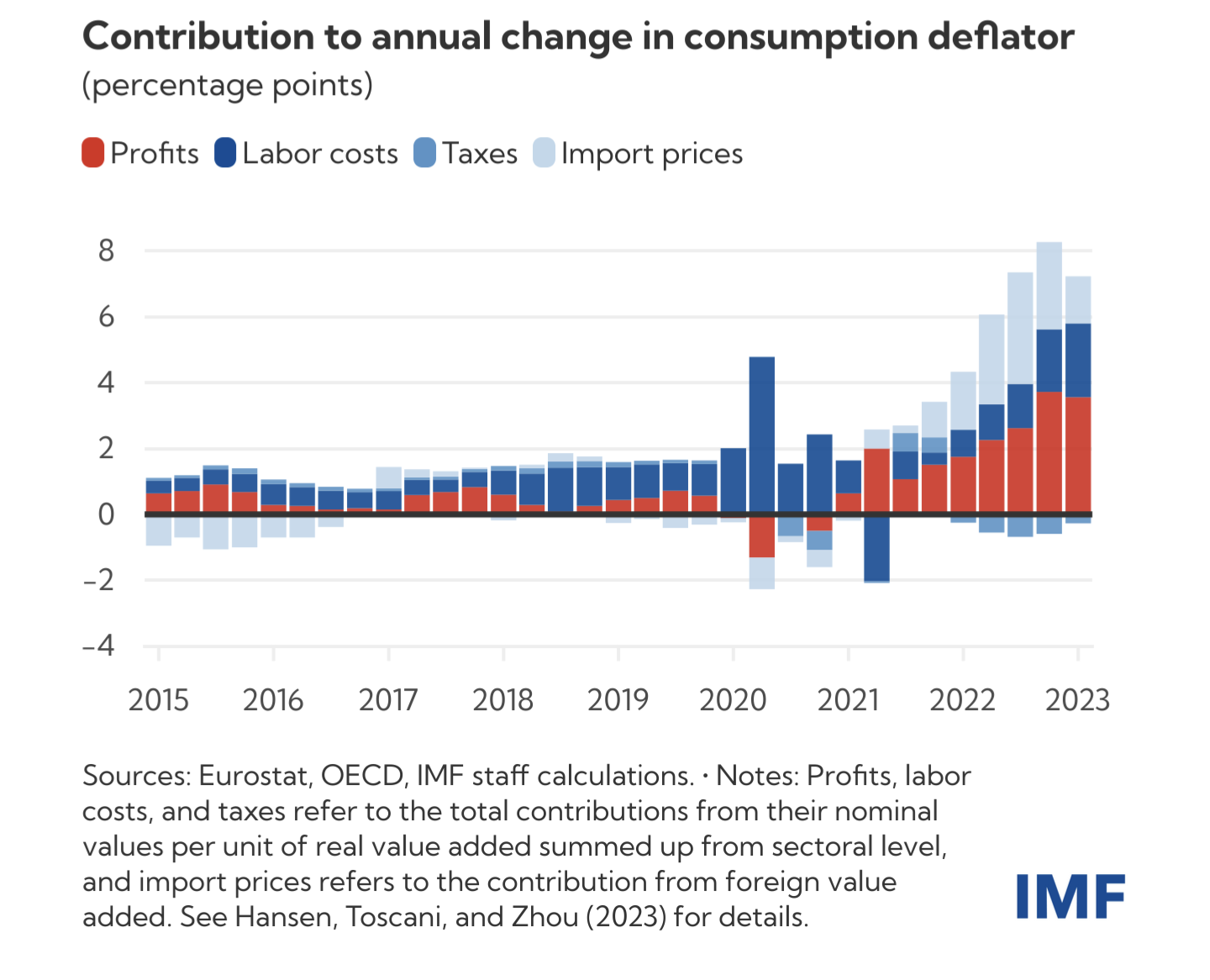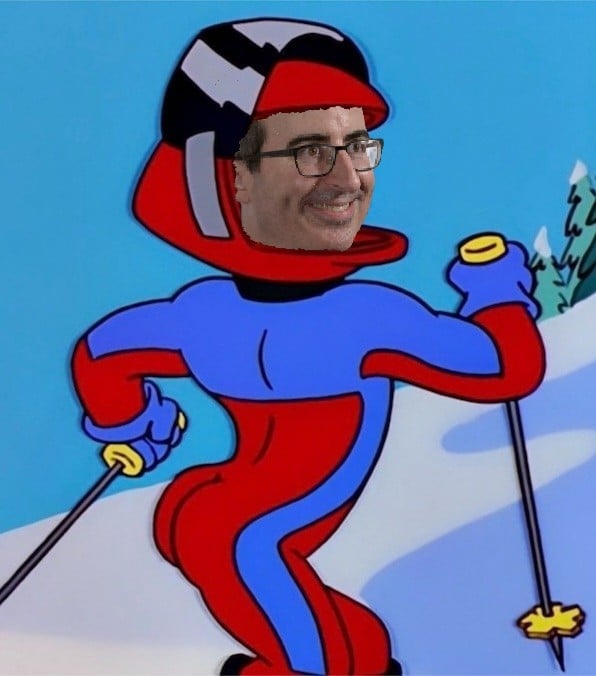It’s not inflation. It’s price gouging.
Yeah it isn’t natural at all and needs regulation on basic items to live
I don’t know, they look natural to me
Price gouging coincidentally at the same time across the entire economy, soon after an enormous increase in the monetary supply.
A—Aurora Borealis? At this time of year! At this time of day! In this part of the country! Localized entirely within your kitchen?!?
Record high prices coinciding with record high profits and plunging cost of good sold, followed by even higher prices. They are testing to see what the pain thresholds are. All that’s gonna happen is that business will start to collapse as consumer spending plummets because people can barely afford to survive. Will the system autocorrect or collapse? Will the government ever enforce consumer protection laws ever again? ¯\_(ツ)_/¯
The loan on my van is paid off, The bank is paying me interest on my savings again, I have a years worth of costco rice stored, and the campsites by the river where i live in my van is empty because everyone too broke to go on holiday. Life is sweet. (No part of this comment is hyperbole)
Out of curiosity is your van largely stock or have you upgraded it?
Mechanically, not upgraded, no. But it was an empty van with an aluminium roof rack when I bought it, and I did the fitout myself. Awning, solar panels, batteries, inverter, fridge, shower, ventillation etc.
Occam’s razor says the more simple/plausible explanation, that a huge increase in the monetary supply causing higher prices through supply and demand, is about a thousand times more plausible than tens of thousands of corporations simultaneously deciding to coordinate to fix prices despite that it’s in each of their best interests individually to break with that scheme. With no actual evidence of a concerted attempt across the entire economy to fix prices (not to be confused with a couple corporations having board meetings where someone bragged about raising prices).
Or, in simple terms - it’s not that every single other good in the entire economy has suddenly become worth more as the result of some overarching conspiracy. It’s that they printed a bunch of money and it’s now worth less.
I would recommend anyone who still believes the “greedflation” thing spends an hour reading some articles critical of the theory. Not really looking for a debate about it tbh.
“Not really looking for a debate about it tbh.”
No, just the last word. There’s a lot more to it that clearly explains why it’s a systematic failure that led to this, and it’s a lot more complex that just over supply of cash. You can’t stop looking at other facts once you’ve researched just enough to find an answer you’re comfortable with.
Your previous comment was basically a massive industry wide conspiracy theory though, so their response of a more sensible answer to give you something a bit more concrete to go on was pretty reasonable to me.
Not a conspiracy theory but the inevitable conclusion of a system left unchecked by regulation for too long. We have slowly rolled ourselves to the edge for decades yet have been able to maintain a very precarious balance, until a worldwide pandemic kicked the cart and set it rolling down the hill.
Did the entire planet have too much cash and an urge to spend it all at once? Yes. That only explains the flashpoint where prices exploded. Demand was at an unprecedented high from the world coming out of lock down at the same time that supply was at an all time low thanks to the pandemic. (There’s a lot more to all of this of course, but there are going to be countless PhD thesis written about this macroeconomic clusterfuck and this isn’t one of them.) So far, this all makes sense. Where things go sideways is when supply stabilizes, cost of goods sold start to go down, and yet prices continue to rise. Remember how the fed thought that information was going to be a short, temporary spike that didn’t require intervention? This is why. They expected the system to autocorrect, but it didn’t. Prices continue to rise. People have less money. Prices continue to rise. Interest rates skyrocket in an attempt to cool the economy. Prices continue to rise. Consumer spending slows but prices rise.
Corporations are literally geared towards maximizing profits. It’s not a conspiracy if they are working as intended. The failure, IMHO, is in how we have chosen to manage our economy. Complete deregulation and a slew of other choices have brought us here. Not a conspiracy but also not as simple as “too much money” or “too much cheap credit”. So, amending my original comment, yes it is in part inflation but it isn’t just inflation.
PS: Credit card debt in the US surpassed $1T. We’re running on literal borrowed time and every business around us is trying to find new and creative ways to squeeze every penny we don’t have out of us, by design, without a check or a balance in sight.
It is specifically a conspiracy theory that there’s a price-fixing cartel across the entire economy. You can give rhetoric about unchecked capitalism and all this, but the fact still remains that we’re talking about hundreds to thousands of companies that would have to opt into this scheme (drawing the line fairly arbitrarily at “the ones that comprise most market share”).
I raised this point already - individual corporations are incentivized to break with a price-fixing scheme because it increases market share. Consumers don’t want to pay exorbitant prices if there’s any alternative. Didn’t hear a response.
You believe whatever you want. Can lead a horse to water but can’t make him drink.
I’m sorry you’re under the impression that the economy is controlled equally by tens of thousands of corporations. Its much more like 2 dozen control nearly all money that presently exists. They wake up everyday and fix prices. They’ve been doing it a lot ever since 2008 and the utter downfall of consumer protections. I also have no fucking clue what you mean when you say that not fixing prices is in their best interests?? Like, you realize that by price fixing they make billions of dollars more than they should be? How tf is making even more money not in the interest of a corporation? They literally profit off of wars. Any possible thing that increases the amount of capital they generate is in their own best interests. Even employing children, or slaves. Capitalism is designed specifically to be exploitative of as many people as possible to generate as much capital as possible.
I’m sorry you’re under the impression that the economy is controlled equally by tens of thousands of corporations. Its much more like 2 dozen control nearly all money that presently exists.
There are 8 million businesses in the U.S. We have problems with monopolization, but to the level where a cross-economy price fixing scheme could possibly be implemented, we are not at that point. That’s an extraordinary claim requiring extraordinary proof, not something to just believe dogmatically because you don’t like capitalism.
I also have no fucking clue what you mean when you say that not fixing prices is in their best interests??
You could start by just asking me. This is basic game theory. Market price of a good is 10 dollars, ACME and BLLC corp meet and fix prices at 15 dollars. ACME corp goes to market at 15 dollars, BLLC corp goes against the secret agreement and goes to market at 10 dollars. BLLC gets ACME corp’s customers as long as they retain their price at 15. Now take the same example and spread it across hundreds, thousands of companies, keeping in mind that this level of coordination would leave behind proof, witnesses, and take an extraordinary level of coordination. Non-participation in a price fixing cartel for a minority company could mean capturing the entire market, and anyone who was participating would immediately be incentivized to exit it.
This is what is being posited, versus the dirt simple explanation that more money has been printed and has thus decreased in value. And we know a ton of money was printed.
Price-fixing cartels aren’t impossible, however, they do become completely impossible to create or maintain at a scale like that. There is simply way too much competition. It’s an extremely elaborate, poorly substantiated theory to explain something there’s an obvious, well-substantiated explanation for already. I don’t know how you guys think about applying the scientific method, but to me, that ain’t it.
This is basic game theory
Perhaps real life is more complicated than something you can read in an introductory textbook.
Gosh, never thought of that.
Just gonna leave these links here.
https://www.theguardian.com/environment/2021/jul/18/america-food-monopoly-crisis-grocery-stores
https://www.webfx.com/blog/internet/the-6-companies-that-own-almost-all-media-infographic/
https://finance.yahoo.com/news/handful-companies-control-almost-everything-152800823.html
Yup, well aware how much monopolization there is.
Here’s corporations in the US by market cap:
https://companiesmarketcap.com/usa/largest-companies-in-the-usa-by-market-cap/
Keep in mind we’re not talking about simply “6 companies dominate a single industry”. The burden of proof for “greedflation” is simultaneous price-fixing behavior across the entire economy. Across essentially all corporations.
It’s called price leadership and it is an extremely well established phenomena in economics.
It’s an established phenomena. But, just because it’s established as a concept, doesn’t mean it’s prevalent, or especially not that it could be used to explain simultaneous increases in prices across the entire economy.
Here’s an introductory article on price leadership:
https://www.investopedia.com/terms/p/price-leadership.asp
Breaks it down into “barometric”, “collusive” and “dominant” categories. Going through each one -
Barometric being the phenomena where all the firms in a space look to the dominant firm for indication on what to do with their prices. Assumes heavy market concentration in the dominant firm and a marked imbalance to analyze market trends or predict upcoming cost shifts on the part of other companies. Does not make any sense in a space with several near-equally sized entrants in the market exist with similar capabilities for determining prices and macro conditions.
Collusive being where they have actually agreed to fix prices together. This is of course illegal and requires ongoing coordination across basically every major company in the economy. This is mostly what we’ve been talking about in this thread and requires extraordinary proof, because the level of coordination required to make this happen is extreme, especially across not just one industry, but every industry. Or, to be fair, at least the basic industrial/manufacturing industries upon which all other industries depend.
Finally there’s the “dominant” category. That’s where a single dominant firm (or cartel of multiple firms) is setting prices - particularly, setting them downwards - and other smaller firms are forced to lower their prices to survive. This doesn’t make a whole lot of sense with upwards price-fixing, because less dominant firms become more competitive as a result, not less.
No… Not to my understanding. Inflation, while an average, is not equally rising across all things. It is possible for the few that control food to raise prices together. Same with clothing and other industries. I think it’s also exacerbated by the shipping fiasco during covid and the fact that corporations always want more profit. As a general rule, any time prices rise for any reason, and shipping can make everything rise together, if people still pay that price, it will not be lowered.
Yeah, so we barely touched on the actual shortage issues from COVID in the thread here. That is for the most part a short term phenomena, and prices can actually resume prior levels after disasters and such like that, while actual monetary supply increases are typically permanent. And yeah, some industries (like energy) are pretty fundamental and can affect prices in a lot of other places, and there was additionally the energy shortage triggered by the Ukraine invasion. All these factors can cause price seeking and instability, but the key thing to point out is that that’s transitory, because after some time the costs of goods reequilibriate. But if you’ve increased the money supply 50%, then the price increases become permanent.
If you’re going to bring in Occam’s Razor, it’s probably less tenable to argue the ‘a conspiracy is more complex than the alternative’ argument when there’s obviously a set of shared motives driving labor costs down while at the same time pushing up profit margins. The fact that profit margins are up does a lot of damage to the ‘it can’t be greedflation’ theory
argument when there’s obviously a set of shared motives driving labor costs down while at the same time pushing up profit margins.
Well, just because they have shared motives doesn’t mean they’re going to act in concert with each other. They’re competitors. One’s market share loss is another’s market share gain.
The fact that profit margins are up does a lot of damage to the ‘it can’t be greedflation’ theory
It might help to clarify what “it” we’re talking about here, or for that matter, what exactly we’re referring to with “greedflation”. To be totally clear, companies will raise prices when the market will bear it, and when they have a monopoly or cartel, that can be nearly indefinitely. The thing I’m objecting to in the first place here is the notion that that’s just universally the case across the entire economy, which strikes me as ridiculous and a way for the government/central bank to deflect blame for monetary inflation. And to your point - for any highly competitive market, it’s a very elaborate explanation versus just that supply and demand has caused prices to increase because the supply of money has gone up, which is a very simple and fundamental phenomenon in econ. As a rule of thumb, the more diversified the market is, the less likely that is to be the case.
We did see a big supply shock when Russia partially cut out of the global energy market, causing the market to chase after oil from the remaining producers, causing an increase in price. That’s not some new phenomenon, that is also just basic supply and demand. It does cause price shocks, even if their costs didn’t go up, even if labor didn’t see the benefit. That’s not, however, some permanent state of “inflation” like monetary inflation which is just never reversed for the entire remaining lifetime of a currency - supply shocks are transient (at least until the fossil fuels actually run out).
The problem with consolidation is that companies that gain a majority market share are operating at the lowest of margins, so there is little room for new competitors to move into that market space.
Since these companies already own the market, it is too expensive for another company to enter that market space while competing successfully. The larger and more established companies already have economies of scale that are tilted in their favor. The only way for a new company to compete successfully against an entrenched business is by leveraging new technology or huge investments to bring their cost lower than their competitors.
And we’ve seen that happen in the past with agribusiness, they get large investments and just buy up all the other companies and put them under their own umbrella.
There is inflation I agree, but I think a significant percentage is from price gounging, around 30%. I saw a study detailing this that I could find and link if you want.
If you’re wondering how it can happen simultaneously accross whole countries and much of the world, you can look up the concept of “price leadership.”
See my reply to your other comment https://lemmy.world/comment/2308508
Can I see it?
No.
“soon” or maybe you need to review your oversimplification of complex issues

What are you trying to demonstrate with this chart? It doesn’t compare inflation vs. profit/profit margin increases.
Rose by any other name?
But yeah. It’s all made up.
No, it’s inflation. Too much money chasing too few goods. Caused partially by years of central banks across the world injecting new money into financial markets and partially by the massive dump of new money into the consumer economy in 2020-2022.
Too much money chasing too few goods?
Wrong. Supply is fine.
Prices are going up because people are willing to pay higher prices than they were. We still have not found a new ceiling. It’s not “all the money printed by Trump” that caused a giant spike in inflation (that only played a small part). It’s record profits in a variety of industries convincing anyone and everyone to charge more.
100%. I don’t know why anyone expected anything different - we’ve been printing and printing and printing money for the last 10 years. Chickens are home, roosting.
This particular theory is far too prevalent. Corporate executives are tugging themselves silly at the sight of people blaming the government instead of the people who paid them.
That’s fucking moronic… The US government has had that money printer running since Nixon… It’s just garbage all around regardless… even though they are and have been some slightly less garbage parts
Look at the Feds balance sheet (or the ECBs balance sheet) over time and then tell me that again.
It’s amazing it worked for as long as it did, actually.
tbh both inflation numbers are hot
Yeah, I wouldn’t mind being screwed by either of these inflations.
Small tits fan checking in.
Nah reported inflation is better. Too much inflation might drown you
It’s a risk I’m willing to take.
If I learned anything from the film Weird Science it’s that anything bigger than a handful of inflation, you’re risking a sprained tongue.
The inflation report that came out today specifically omits fuel and grocery prices because those are “volatile” categories. My grocery bill is double what it was two years ago and has been for six months. I wouldn’t call that volatile.
Groceries are stupid, it cost me $20 to make a lasagna that last year cost $10.
was it twice as good tho
no
Probably twice as bad
It’s funny you say this, because my wife and I just made a lasagna and were shocked it cost nearly $30.
Costs me $12 to make 2-3 sandwiches at home using deli meat and cheese, a loaf of French bread, and 2 small tomatoes. That’s while taking advantage of sale prices. Would be more like $8/sandwich if I hadn’t bought the meat and cheese on sale.
its basically 2 year ago eating out prices to make shit at home these days
Wtf. I mean I realized how much you us people pay for food when I was there last year, but 20$ for lasagna. What’s going on? I think I can easily do it under 10€,even buying “better” meat.
They didn’t omit those prices. CPI and Core are two separate measurements. Core excludes food and energy.
In fact, excluding food and energy actually made the numbers worse. CPI is at 3.2% YoY. Core is at 4.7%.
Idk man ground beef is still like $3 a pound for me, milk $2.70 a gallon, pasta $1 a pound. I’m not saying some things haven’t gotten more expensive because they have, but my grocery bill from 2 years ago is like 20-30% more expensive now.
I’m not sure what point you’re trying to make. A 20-30% jump in a grocery bill is unprecedented in my life time. I’m skeptical it’s even that low for most. Pre-pandemic, I was buying eggs for 1.39, they’re 2.49 now. Jarred spaghetti sauce used to be 1.99, it’s 3.49 now if I catch a sale. I used to be able to regularly buy chicken breast for like 1.49-1.99, now if it’s less than 3 I buy as much as I can afford and freeze it. This time of year in my area, corn would usually be on sale 4/$1. The cheapest it’s gotten is $0.79.
Just repeat ad nauseam for everything. The other day I was in the store thinking to myself, “I’m not sure I can afford convenience foods like canned beans.” Canned. Fucking. Beans. The luxury.
I’m spending $2.30 for 18 eggs, buy spaghetti sauce at $.99 or so, and generally pick up chicken at about $1 a pound. Never seen corn on the cob for more than $.50 a cob, usually less than that. Bush’s beans, we just picked some up at $2 a can.
They likely live in a different place than you do Sounds like you got it way better, congrats
Seems like you have a sweet deal somewhere. I can’t remember when I last saw spaghetti sauce that cheap and my chicken is 4.59 a pound.
S&S market in my town of Clovis always had some cut of chicken at that price. Shit, if I really want to cheap out, Walmart has chicken leg quarters for $7 for a 10 lb bag
New Mexico?
Yeah
Grocery prices can vary widely depending on location. The absolute cheapest Walmart ground beef I can get is $4.50 per pound and milk is $3.62 a gallon. Pasta is a $1 pound and eggs are relatively cheap here. Produce has gone through the roof.
lucky. in Australia milk +50%, bread and rice +100%, pasta only about 20%, meats are almost out of reach ($12aud for 12 shitty supermarket sausages about 1kg worth is about as cheap as it gets. fruit and veg has always been volatile and fluctuates but I would say on average 20% more now
People in the US scream about inflation but many of them have no idea how bad it is in other countries. Places where food products are sparse or imported are extremely expensive. There’s not that much stuff we don’t produce or grow in the US.
My buddy in Ghana has been especially hard hit. I’ve increased my remittances because he literally can’t afford to eat every day anymore on his wage.
Where I am at,ground beef is more in the $5-6/lb range, as a comparison. We have some dairy farms local so milk is a bit cheaper, but basically everything else is significantly more expensive, especially meat.
I can get $4 a lb ground beef in a convenience store
Yeah we can buy ground beef for around 7€ the kilo (2,2lb)
Depends where you’re at. Ohio? Same. Florida? 2-3x
Florida: not even once
California has leveled out quite a bit too.
Florida has regional problems due to their ahem “policy choices” as of late.
inflation can’t be that cute
I wish my country’s government had the testacles to cap prices on food. I order food mostly online and I compared prices from 2 years ago and most things are at least 200% more expensive, cheese for example is like 600% though.
If they cap prices on food, then you’ll see food shortages instead of expensive food
How so? In my country, certain basic food items are priced capped AND rationed, meaning you’re only allowed to buy a certain amount of it at a time.
> but but but muh freedum market$$
No! Worldwide, the agricultural sector is THE MOST SUBSIDISED economic field. You can’t have it both ways. If taxpayers’ money is used to prop up your business, you have a duty to the taxpayers and country.
Subsidies may distort the market but they don’t change the existence of the supply/demand curve. Any producer of a product is going to sell their goods to the highest bidder, and if someone is capping what a product can sell for that means capping what they can purchase the product for. Grocery stores aren’t going to sell for a loss.
If the central government enacts a scheme of rationing and central purchasing, that’s one thing. But in a free market situation if a grocery in country A will buy lentils for €1 a kg and country B can only pay €.50 then the lentils are getting sold to country A until that demand is fulfilled. Which means shortages in country B.
Considering how much billionaires hoard, im happy just tacking a sales quota on at the same time so they just have to eat losses for a bit. People eating is more important, and frankly anything that forces the robber barons to lose money back into the system is a good thing
Why wouldn’t they just close their business if it was unprofitable
They could, and if they do, the land it occupied should be seized and turned into a community owned cooperative.
Cool, so, the government can just turn into bandits if we don’t like what private citizens do on their own land. Oh, and if they complain, why not just send them to the gulag?
Most food here is locally produced, I don’t see how that would create a shortage. Like people aren’t going to sell their grocery stores cuz their margins are thin again and farming is so heavily subsidised that I don’t see it effecting farmers.
If a local producer can get more selling to someone in the next country, they will. Basic economics. Prohibit them from doing so and they might plant something more profitable or just say “fuck it” and let their fields lie fallow, if they’re not making a profit. Farming ain’t free and farmers are on thin margins.
Small farms are long gone. Farmers the the most heavily subsidized sector in the country, and they’re not run by Ma and pa, but big multi-national corporations who use extractive agriculture that damages the soil, results in worse yields than more sustainable agriculture, and requires insane amounts of chemical fertilizers, is rapidly contributing to the death of all of our most critical pollinators.
I have really almost no sympathy for monoculture farmers who grow thousands of acres of almonds using trillions of gallons of water in a state perpetually under severe drought.
Literally, just by seizing the lands used to grow alfalfa for Saudi Arabia and almonds in California, the majority of the country could be fed cheap on low water, low maintanence, high yield food forests. We don’t need to subsidize murder farms where pigs are fed to their children as slurry when that same land could be used for vertical gardening.
The use of farmland for exclusively profit driven reasons is what drove the Great Depression. Farmers don’t deserve A profit if what they’re growing isn’t sustainable or catered towards the health of the people.
🙄
*affecting
And you’re wrong. Farmers and grocery stores are already operating on thin margins. Sure we could double subsidies but then why not just make food free instead? How about we just make food free for people who can’t afford it, maybe with some sort of special card
Farmers yes, grocery stores not anymore. Profits of companies is public info here and they started racking it in the moment the massive ‘inflation’ started. My parents live near a farm and they just buy veggies directly from them for like a fraction of the price, I unfortunately live in a city though. Prices are better at local markets but there arent many of those.
Prices are better from a farm because you’re skipping two steps on the distribution chain, at least - a food warehouse and the grocery store. Could be three, some grocery stores buy from an intermediate warehouse distributor that services smaller stores.
So potatoes might be sold at .20 on a farm and .50 at the store, because they need to be sold twice to reach the store, transported twice, bagged, washed, stored twice, and finally placed in the retail front for sale.
Why did you ignore the part where I said that the profits for grocery stores soared? Producing food has not become more expensive, that’s all public info here.
It runs the risk of affecting the farmers a lot especially in Europe where they will soon have to deal with very expensive electricity. So the government would have to know that it’s really price gouging and not a necessity (I believe it’s price gouging, but governments can’t (or shouldn’t) make rash decisions on beliefs.)
Dont. Here in Hungary the commie ruling party (fidesz) capped some food prices, which lead to world recorder food inflation (47% measured), and top 3 overall inflation (36% measured). A lot of food products are 100-300% more expensive, also i cant say any product (not just food) that isnt became at least 40% more expensive. When caps lifted, there was a smaller price drop.
They also capped the fuel prices, then when they revoked the cap, the fuel became one of the most expensive from the surrounding countries.
Communist methods cause more problems than solve
Fidesz are now commies? Yeah sure.
They always were, orban was a secretary of the communist youth organization (KISZ), and most of his party members had high level functions in KISZ and the state communist party (MSZMP). They currently also act like that, with some fascist spicing on the surface.
Sure, anyone who had political power back then was “communist”. But is his party communist? What communist policies do they want?
They are commies, not communists. These are not the same. Communists actually beliving in something, commies arent. These are commie style things: -govermental prices -govermental success propaganda (picking some real, but mostly fake stats, and cheering these up, while hiding the not so good statistics, and saying those are fake, made by western subversion, telling everything good is made by them and the supreme leader, everything thats not good is done by western subversion) -governmental demonizing propaganda (actually same as in full commie times, like “declining decadent west, but the mighty east”, who tells something against their myths is a western spy, everyone is weak and unsuitable who isn’t the, “fight” “war” against everybody who is not them -govermental pressure to leave, or give up to them everything that isn’t controlled by the party -fidesz (orban’s party) voted against revealing communist agent files, 23 times, which means they are anti-communist only in words, but actually they are in these files as agents. Probably this how putin is blackmailing orban, as they have a copy of every document from the hungarian goverment from 1945-1989, and maybe more. -they using the same slogans, and passwords like the commies did -they act very similarly as their predecessors in rákosi, and kádár system (the two eras, and dictators of the commie ruling) did
Yea we have a food inflation pretty close to those measured numbers though in reality its a lot higher and that’s without any caps. Also how could a food price cap cause inflation in food prices? That’s literally the thing you are capping.
The things that are capped no longer produce (as much) profit, so food suppliers move to items that do bring in profit. Uncapped goods are now more desirable, and the suppliers increase prices to try to make up for the shortfall caused by price controls, making uncapped items even more expensive.
Government intervention like price controls always makes things more expensive, it’s just a question of where that expense is spread to.
The government capped the price of electricity here a short while ago and that lowered the price of power massively.
Seems the solution would be to cap the price of all food then.
No, it isnt lowered the price, but you will pay for it elsewhere, indirectly, same like we are in hungary (that also caused rise in inflation). Communism not worked, and never will
Yea, price capping is as much communism as having public healthcare and when the price of electricity was capped it lowered the prices massively.
What was going on was the local power companies made deals with other countries and basically acted as middle men for reselling that power for a massive markup. Our government made a mandatory power plan that forces power companies to produce electricity locally for local supply at a fixed price and that pretty much fixed that. Those companies couldn’t sell power at a massive markup anymore because everyone would just switch to the government power plan then.
No, the the prices don’t get lowered on capping them, just you pay it from elsewhere. For example in hungary the commie orban capped the electricity and and natural gas prices, so the people pay less on the bills they get (well, not always since they restricted the “discount” only to private person users, and with limit, if someone out of these, they pay much more than the actual real international market price), but they pay of the real, actual price from their tax (in hungary every taxpayer pays 17000 hungarian forint extra over the actual natural gas bills, just they dont see it, as its taken from the usual tax). So the dumb people just seeing the lower price on the bill they actually get, but not the tax money that is used to pay their “discounts”. Also, as the companies getting the electricity, and natural gas on “govermental market price”, which is 2x more than “discounted” price in electricity, and 7x more in natural gas (about 4x more than the real international market price), which causes prices going up in restaurants, groceries, every commodities that are made, or processed by local companies, which causing the skyhigh inflation. Its just simple common sense, and the economic fundamentals, but a lot of hungarian people lack of these, and not just hungarians :(
Who? How could cause? In EU the second highest inflation is in slovakia (first is hungary), which is the half of the hungarian inflation. The difference is few hundred kms, and that in slovakia they dont have price capping commies like orban, and his comrades. And yes, here in hungary the real inflation is much more higher than the “measured” (ordered).
My country’s news say we’re improving with a straight face. And I’m like “improving in what? Making the country sink more efficiently?”
The stockholders have improving profits. That’s all the media cares about. If profits go up, the media will be praising it even if inflation is killing the bottom 90%.
“It appeared that there had even been demonstrations to thank Big Brother for raising the chocolate ration to twenty grammes a week. And only yesterday, he reflected, it had been announced that the ration was to be REDUCED to twenty grammes a week. Was it possible that they could swallow that, after only twenty-four hours? Yes, they swallowed it. Parsons swallowed it easily, with the stupidity of an animal. The eyeless creature at the other table swallowed it fanatically, passionately, with a furious desire to track down, denounce, and vaporize anyone who should suggest that last week the ration had been thirty grammes. Syme, too — in some more complex way, involving doublethink, Syme swallowed it. Was he, then, ALONE in the possession of a memory?”
Literally 1984, but this time it isn’t even a joke (I’m fucking scared)
I’m honestly not sure why there isn’t civil unrest worldwide. People have got to be suffering mass homelessness at this point and starving. I did hear that theft from grocery stores increased but to me it’s well deserved.
The Internet happened
Well deserved or justified? I don’t think a grocery store deserves being robbed given that they operate on slim margins, but if you steal a loaf of bread because you are otherwise going to starve, then I think you are justified.
A corporate grocery store will be just fine and they have tax write offs and benefits normal people don’t.
In some ways, the reported inflation is real. The main increase in cost is not actually real, or caused by anything except greed.
There’s also a lot of hidden costs that aren’t factored into inflation as strongly as they should be, or at all. Those hidden fees have also gone up.
So the entire business segment is just hand waving the whole issue because they know it will be reported wrong; they’re going to keep raising prices and point to the “official” inflation numbers and continue to feed us the bullshit that inflation isn’t a problem to justify never giving their employees a raise.
IDK how stupid they think we are, but I’m sure they think we’re little more than retarded (I mean that in the clinical sense). They’re (very publically) showing massive profit numbers, using inflation, or the lack thereof, to justify slave wages, while ripping off their users as much as they think that they can without creating riots.
More for them, less for us. As it’s always been.
Yuck
Sir, explain
I wish these had been dick pics instead
I wish it was sonic
RIP to your DMs
deleted by creator
Have you read the Discworld?
Feels like everything is too expensive these days. Rent now takes more than 1/3rd of my income and I’m trying out different foods so that I can save on groceries. Hell, I don’t drive anymore if I can avoid it. Shit is getting rough out here.
Well, thing is, some product categories probably aren’t suffering the same price hikes as groceries, fuel and rent. Stuff like cable and internet, clothing and office supplies are probably bringing the average down (please tell me if they’re having inflation, I pulled these categories out of my butt).
I hope we see deflation eventually… I know it’s not good for the economy but no one wants to pay 100 dollars for a coke
That’s the fun part! It never deflates! I guarantee lots more prices for consumer goods could have already come down, but damn do they love the idea of keeping those price points where they are. We already need another round of inflation on wages to get to where we were.
There have been periods of deflation in the past.
no one wants to pay 100 dollars for a coke
Reminds me of a comic strip where a guy goes to Japan and orders a coffee. The cashier says the total is 300 yen and the guy says “damn, coffee is expensive here!”
I just checked, it’s actually 150 yen for a coffee.
Still sounds a lot more than the $3 I pay here (even though it’s less than half as much).
Problem with deflation is: what do people do when theres deflation when it comes to optional expenses? Well, they may postepone them in hopes that prices go further down, this means that there’s less demand, prices go downer, businesses may start to fail, putting people in unemployment, reducing demand, and death spiral. Basically same thing as inflation death spiral but with deflation. Consumer confidence is a very delicate thing
this means that there’s less demand, prices go downer, businesses may start to fail, putting people in unemployment, reducing demand,
I’ve always been skeptical of this and I’m not really aware of historical examples that prove it. The part I just quoted - “less demand, prices go downer, businesses may start to fail” - that means supply decreases too. All that’s really happening if you have a couple % deflation is that people are slightly more incentivized to hold onto their money, and the fact is that currencies don’t just naturally appreciate in value that much, at most in the long term I think you have “the same amount of money in circulation” vs. population growth causing it to chase a slightly larger economy.
If you want a historic example look at the politics In Germany that got Hitler into power. Wikipedia is sadly only in German, but you can see from the graph that there was 10% deflation in 1932, with bad consequences.
I’m sure this does get lumped into “causes of Hitler’s rise to power/WWII” list somewhere. I seem to recall the inflation immediately prior being a lot more famous - that Germany was mandated by treaty to pay reparations after WWII, and that the Weimar Republic printed so much money people were using it as wallpaper or burning it as firewood (supposedly at least). In general, that there was a widespread sense Germany had been wounded somehow, which he was able to capitalize on, telling people to “fight back” against the minority groups he characterized as the forces of oppression. That’d be everywhere between 1918 and 1933 or so. Not so much “the purchasing value of money marginally increased for a one year period prior to Hitler’s rise”.
It’s a myth that the hyperinflation was the reason for hitlers rise. The hyperinflation occurred in 1923. Hitler tried a coup in November 1923, failed miserably, was thrown into prison and the party was banned for a while. In 1928 they had 2,6% in the election.
https://de.wikipedia.org/wiki/Reichstagswahl_1928?wprov=sfla1
Only during Brünings deflation politics the nsdap gained momentum. The vote 1930 gave them 18,3% and in 1932 37,3%. Now compare that to the deflation graph of the other Wikipedia link I gave last comment.
Well, simply attributing it to either side of inflation/deflation is overly simplistic. The simple way of putting it is that people were unhappy in Germany and Hitler was able to capitalize on it in a political campaign against a supposed cause. The German economy in general was on shaky ground following WWI but this was alleviated partially by the Dawes/Young plans, right up until the Great Depression actually started affecting that foreign aid and the economy took another major hit, at which point the Nazis were able to use this as evidence of a “failure in leadership” from the current government, getting Hitler appointed as chancellor, then Reichstag fire started & he seized power.
It probably only is problematic in the same amount that inflation is bad. If it’s a little, it’s fine. If it’s a lot, you’re screwed
TBH this strikes me as the kind of thought that doesn’t come from careful consideration of how it would actually play out.
This breaks the current economic system and will only occur safely once capitalistic GDP and population growth has ceased completely
Some would argue the current economic system needs a little rattling
I also thinks it needs some rattling. But I don’t particularly want to plunge an additional billion+ people into new food shortages and poverty to trigger the necessary reforms if we can’t help it.
When inflation is up the roof I doubt it’s that bad
If you get normal inflation of 2%, you will never see a 100$ coke. The cumulative inflation in 100 years in “only” 700%.
Doubt it’s such a huge difference to make a significant impact
The only happy inflation for me is the one in my pants. This image does it
deleted by creator
When you thought Lemmy would be less cringe than Reddit: 🤡
I mean it is in fact a shitty post.
But can the shit still be cringe when it’s shitty cringe and taken as merely cringy shit? The question of our times.
Is there a c/lost_lemmings? Because this guy would fit right in.
You just gave me a whole new perspective

Sure it’s a widespread increase in the prices of goods and services, but corporate profits are up too so that makes it not inflation, for some reason. /s


























